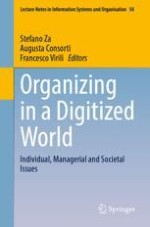In a digitized world, organizations and individuals have to deal with several challenges. Both public and private organizations must revise their processes and create new ones to take advantage of new opportunities and respond to emerging threats. At the same time, people need to redesign their personal and professional lives to create situations or conditions conducive to achieving their goals in an ever-expanding digital environment.
This book contains a collection of research contributions that address the issues that individuals, organizations, and society face when operating in a digitized world. The plurality of views offered makes this book particularly relevant to academics, businesses, and public sector organizations. It gathers a selection of the best papers (double-blind peer-reviewed) presented at the Annual Conference of the Italian Section of AIS in October 2020 in Pescara, Italy
